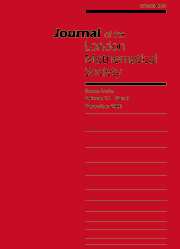Article contents
HYPERGEOMETRIC SERIES, A BARNES-TYPE LEMMA, AND WHITTAKER FUNCTIONS
Published online by Cambridge University Press: 01 February 2000
Abstract
Central to the Fourier development of automorphic forms on GL(n, ℝ) are the class 1 principal series Whittaker functions Wn,a(z), which were first studied systematically by Jacquet [13]. (See Section 2 below for the definition of Wn,a(z).)
Of particular interest are the Mellin transforms Mn,a(s) (s ∈ [Copf ]n−1) of Wn,a(z). (See equation (2.11) below.) For example, such transforms, and analogous Mellin transforms of products of Whittaker functions, arise as archimedean Euler factors for certain automorphic L-functions (see [5, 6, 8, 21, 22] for discussions and examples.) Moreover, Mn,a(s) has relevance to the problem of special values of Whittaker functions; cf. [7] in the case n = 3.
Friedberg and Goldfeld [11] have shown Mn,a(s), for general n, to have analytic continuation and to satisfy certain recurrence relations. However, explicit formulae for these transforms have, until the present work, been deduced only for n [les ] 4. In particular, both M2,a(s) (cf. [4, 25]) and M3,a(s) (cf. [7, 9, 19]) are expressible as (some powers of 2 and π times) ratios of gamma functions. On the other hand, M4,a(s) (cf. [22]) may be realized essentially as a hypergeometric series of type 7F6(1), or equivalently as a sum of two series of type 4F3(1). (See Section 2 below for a brief general discussion of hypergeometric series.)
- Type
- Notes and Papers
- Information
- Copyright
- The London Mathematical Society 2000
- 5
- Cited by




